Analysis of Bioethical Principles in a Healthcare Case Study
VerifiedAdded on 2023/01/04
|8
|2497
|63
Case Study
AI Summary
This case study analyzes the application of bioethical principles – autonomy, beneficence, non-maleficence, and justice – within a healthcare scenario involving a 14-year-old diabetic patient, Tylah, who presents to a sexual health clinic. The assignment examines the ethical and legal considerations related to her situation, including her risk-taking behaviors such as binge drinking and unprotected sexual activity. The nurse's role in providing care, obtaining informed consent, maintaining confidentiality, and navigating the legal complexities of Tylah's age and health condition are also explored. The essay emphasizes the importance of ethical guidelines in healthcare practice, especially concerning patient rights, fair treatment, and the balance between patient autonomy and the healthcare professional's responsibility to promote the patient's well-being. The analysis utilizes Beauchamp and Childress's four main ethical principles and current research to provide a comprehensive understanding of the ethical dilemmas in the case.
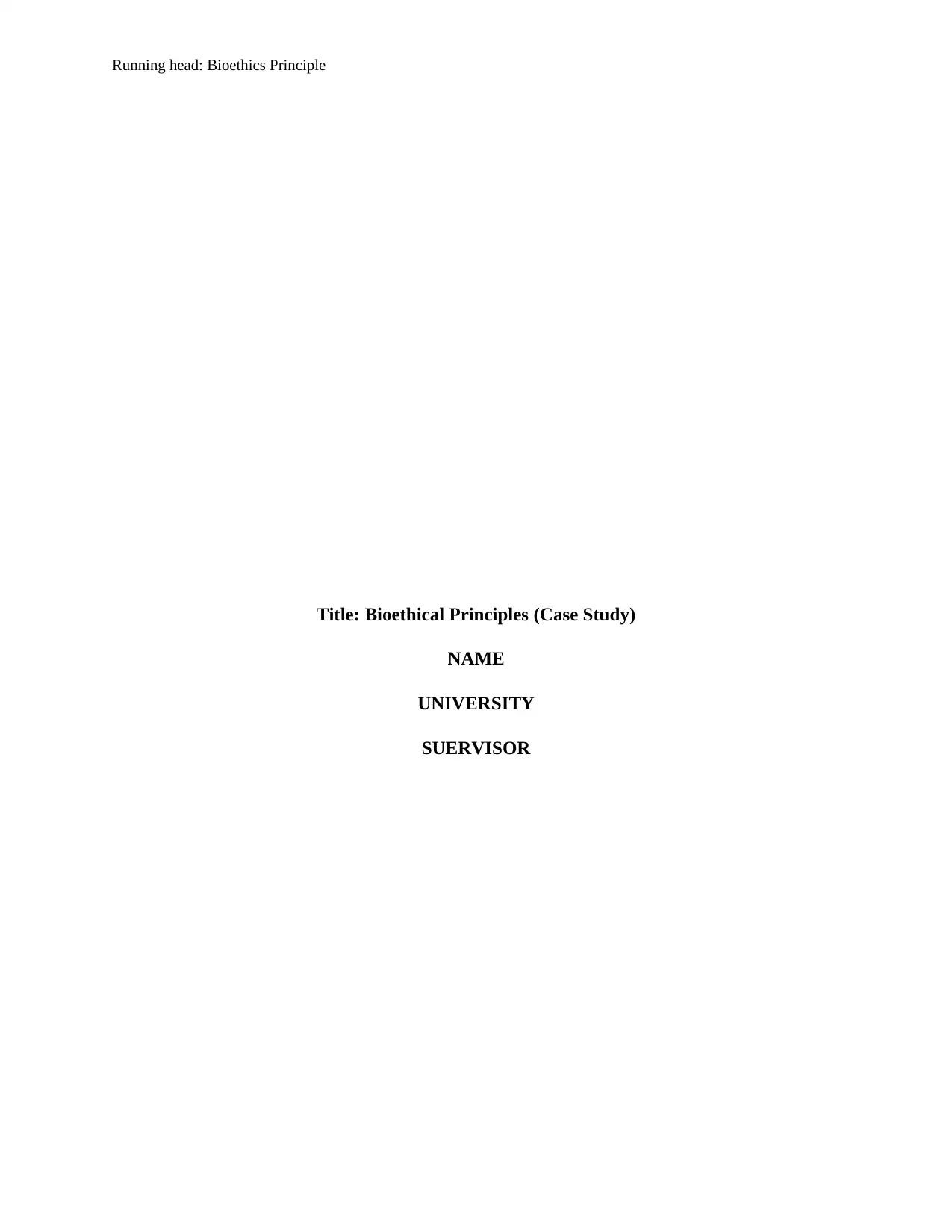
Running head: Bioethics Principle
Title: Bioethical Principles (Case Study)
NAME
UNIVERSITY
SUERVISOR
Title: Bioethical Principles (Case Study)
NAME
UNIVERSITY
SUERVISOR
Paraphrase This Document
Need a fresh take? Get an instant paraphrase of this document with our AI Paraphraser
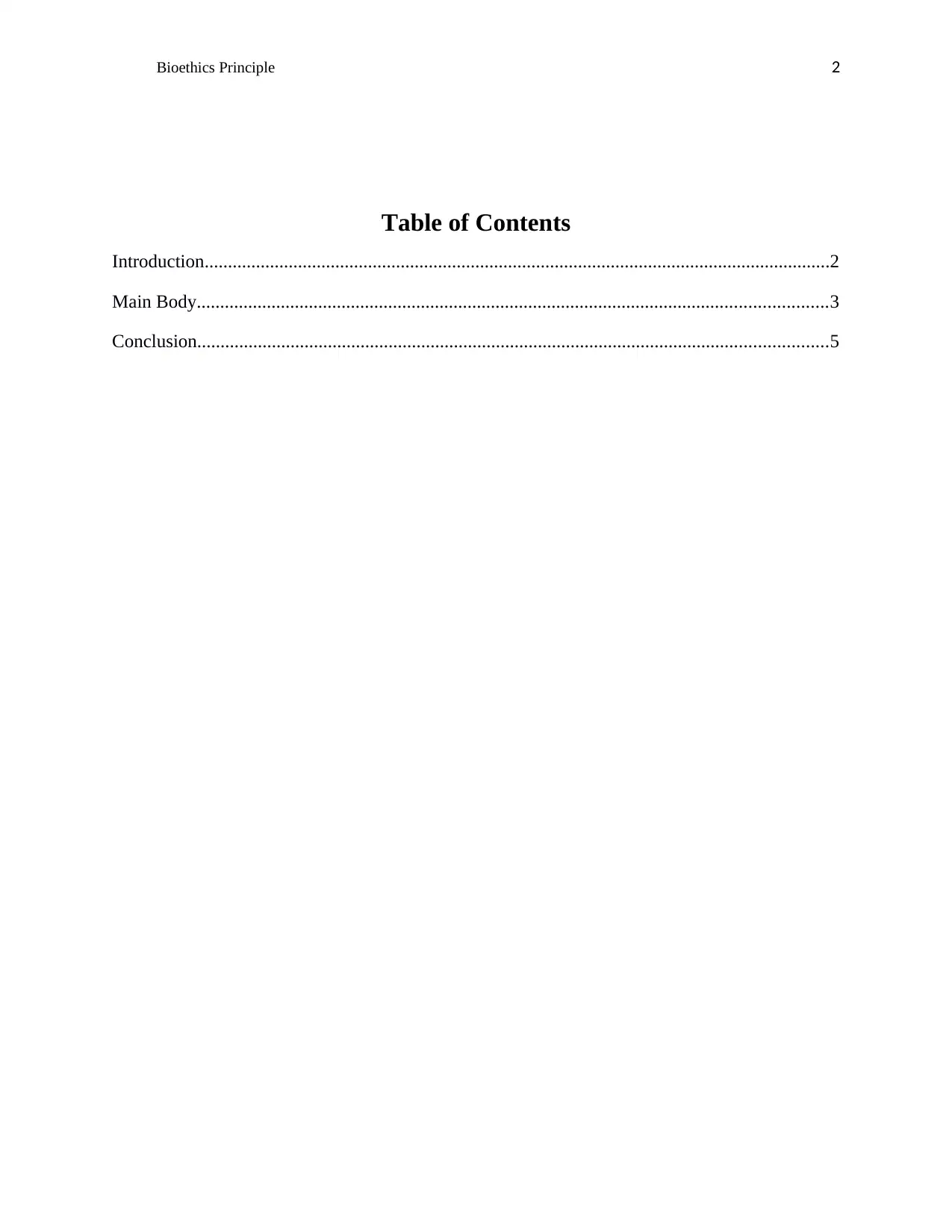
Bioethics Principle 2
Table of Contents
Introduction......................................................................................................................................2
Main Body.......................................................................................................................................3
Conclusion.......................................................................................................................................5
Table of Contents
Introduction......................................................................................................................................2
Main Body.......................................................................................................................................3
Conclusion.......................................................................................................................................5
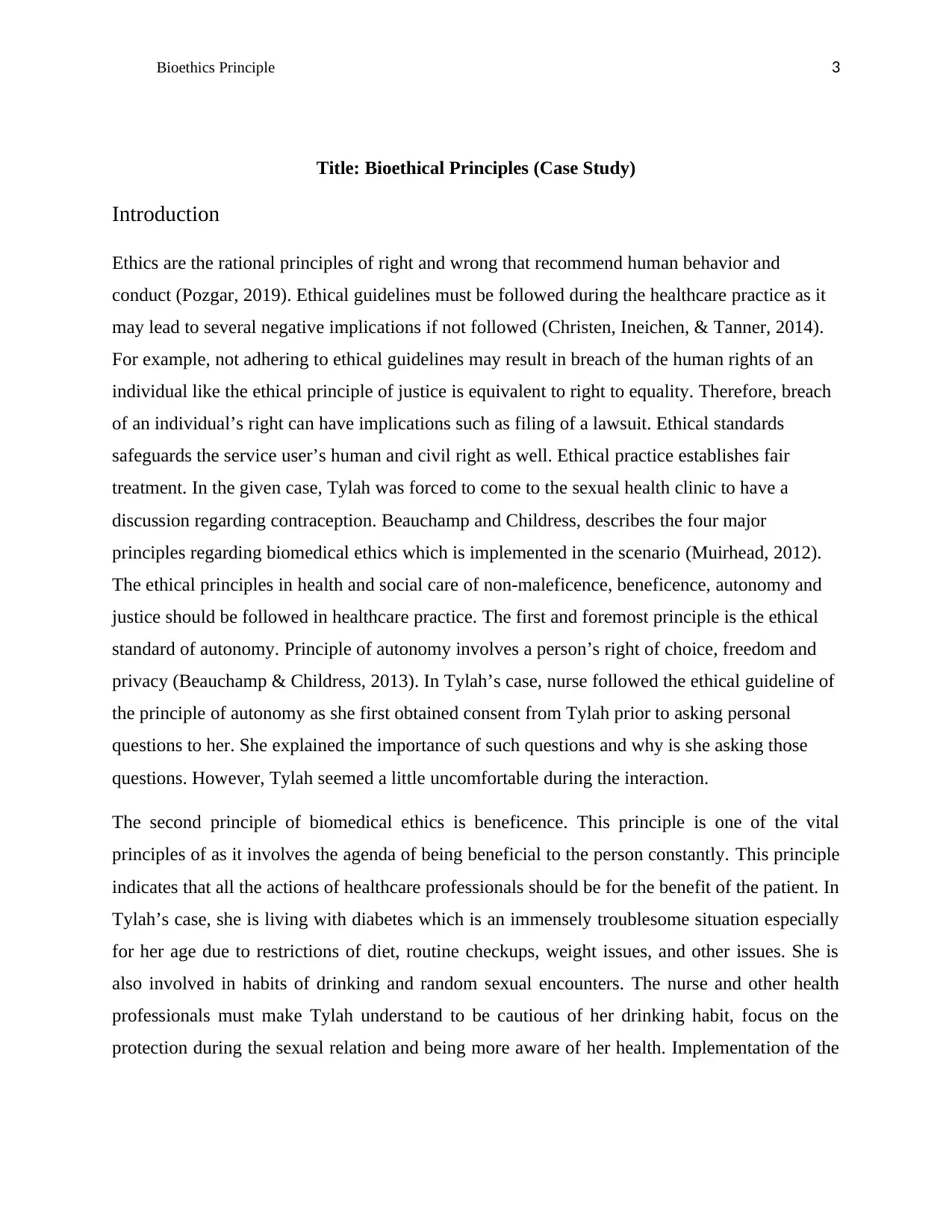
Bioethics Principle 3
Title: Bioethical Principles (Case Study)
Introduction
Ethics are the rational principles of right and wrong that recommend human behavior and
conduct (Pozgar, 2019). Ethical guidelines must be followed during the healthcare practice as it
may lead to several negative implications if not followed (Christen, Ineichen, & Tanner, 2014).
For example, not adhering to ethical guidelines may result in breach of the human rights of an
individual like the ethical principle of justice is equivalent to right to equality. Therefore, breach
of an individual’s right can have implications such as filing of a lawsuit. Ethical standards
safeguards the service user’s human and civil right as well. Ethical practice establishes fair
treatment. In the given case, Tylah was forced to come to the sexual health clinic to have a
discussion regarding contraception. Beauchamp and Childress, describes the four major
principles regarding biomedical ethics which is implemented in the scenario (Muirhead, 2012).
The ethical principles in health and social care of non-maleficence, beneficence, autonomy and
justice should be followed in healthcare practice. The first and foremost principle is the ethical
standard of autonomy. Principle of autonomy involves a person’s right of choice, freedom and
privacy (Beauchamp & Childress, 2013). In Tylah’s case, nurse followed the ethical guideline of
the principle of autonomy as she first obtained consent from Tylah prior to asking personal
questions to her. She explained the importance of such questions and why is she asking those
questions. However, Tylah seemed a little uncomfortable during the interaction.
The second principle of biomedical ethics is beneficence. This principle is one of the vital
principles of as it involves the agenda of being beneficial to the person constantly. This principle
indicates that all the actions of healthcare professionals should be for the benefit of the patient. In
Tylah’s case, she is living with diabetes which is an immensely troublesome situation especially
for her age due to restrictions of diet, routine checkups, weight issues, and other issues. She is
also involved in habits of drinking and random sexual encounters. The nurse and other health
professionals must make Tylah understand to be cautious of her drinking habit, focus on the
protection during the sexual relation and being more aware of her health. Implementation of the
Title: Bioethical Principles (Case Study)
Introduction
Ethics are the rational principles of right and wrong that recommend human behavior and
conduct (Pozgar, 2019). Ethical guidelines must be followed during the healthcare practice as it
may lead to several negative implications if not followed (Christen, Ineichen, & Tanner, 2014).
For example, not adhering to ethical guidelines may result in breach of the human rights of an
individual like the ethical principle of justice is equivalent to right to equality. Therefore, breach
of an individual’s right can have implications such as filing of a lawsuit. Ethical standards
safeguards the service user’s human and civil right as well. Ethical practice establishes fair
treatment. In the given case, Tylah was forced to come to the sexual health clinic to have a
discussion regarding contraception. Beauchamp and Childress, describes the four major
principles regarding biomedical ethics which is implemented in the scenario (Muirhead, 2012).
The ethical principles in health and social care of non-maleficence, beneficence, autonomy and
justice should be followed in healthcare practice. The first and foremost principle is the ethical
standard of autonomy. Principle of autonomy involves a person’s right of choice, freedom and
privacy (Beauchamp & Childress, 2013). In Tylah’s case, nurse followed the ethical guideline of
the principle of autonomy as she first obtained consent from Tylah prior to asking personal
questions to her. She explained the importance of such questions and why is she asking those
questions. However, Tylah seemed a little uncomfortable during the interaction.
The second principle of biomedical ethics is beneficence. This principle is one of the vital
principles of as it involves the agenda of being beneficial to the person constantly. This principle
indicates that all the actions of healthcare professionals should be for the benefit of the patient. In
Tylah’s case, she is living with diabetes which is an immensely troublesome situation especially
for her age due to restrictions of diet, routine checkups, weight issues, and other issues. She is
also involved in habits of drinking and random sexual encounters. The nurse and other health
professionals must make Tylah understand to be cautious of her drinking habit, focus on the
protection during the sexual relation and being more aware of her health. Implementation of the
⊘ This is a preview!⊘
Do you want full access?
Subscribe today to unlock all pages.

Trusted by 1+ million students worldwide
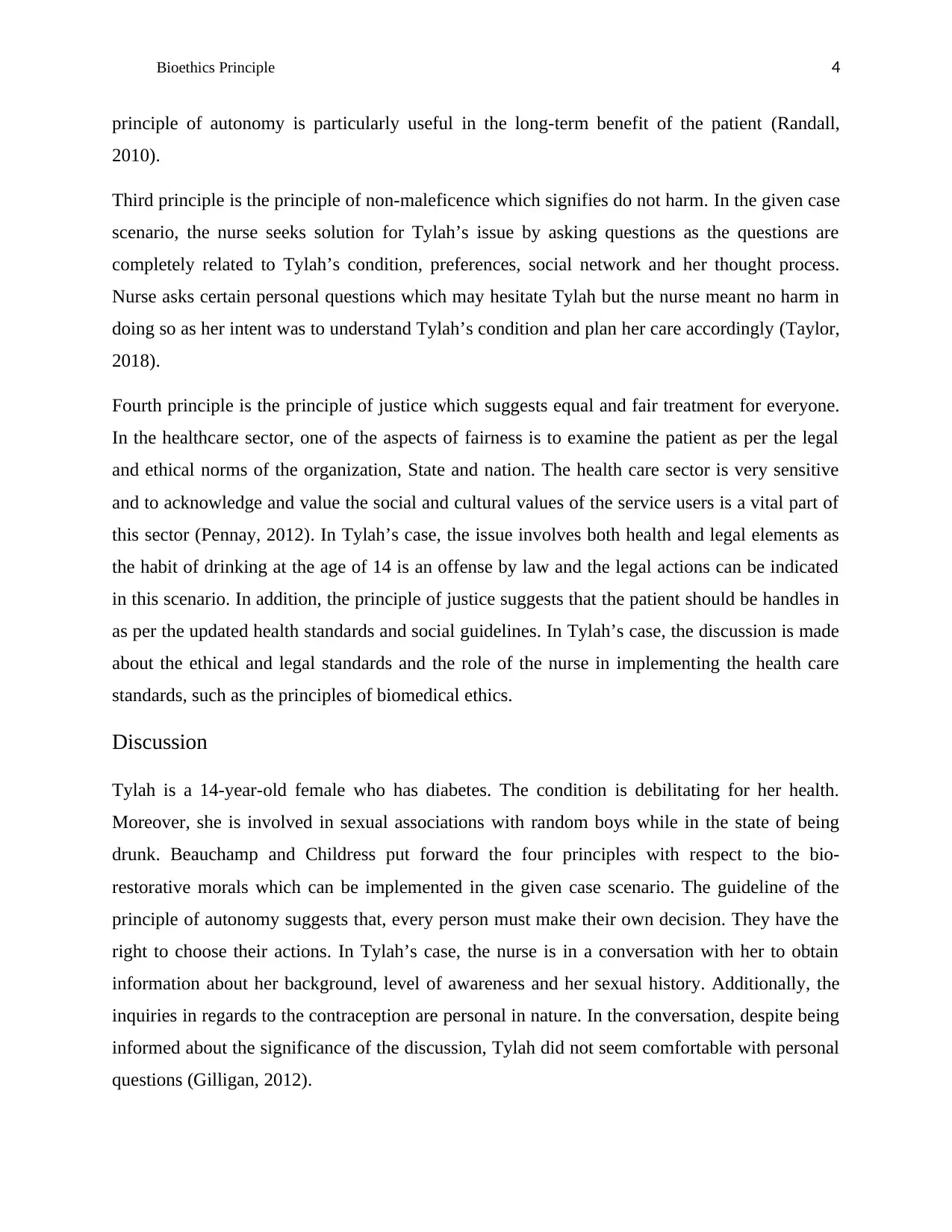
Bioethics Principle 4
principle of autonomy is particularly useful in the long-term benefit of the patient (Randall,
2010).
Third principle is the principle of non-maleficence which signifies do not harm. In the given case
scenario, the nurse seeks solution for Tylah’s issue by asking questions as the questions are
completely related to Tylah’s condition, preferences, social network and her thought process.
Nurse asks certain personal questions which may hesitate Tylah but the nurse meant no harm in
doing so as her intent was to understand Tylah’s condition and plan her care accordingly (Taylor,
2018).
Fourth principle is the principle of justice which suggests equal and fair treatment for everyone.
In the healthcare sector, one of the aspects of fairness is to examine the patient as per the legal
and ethical norms of the organization, State and nation. The health care sector is very sensitive
and to acknowledge and value the social and cultural values of the service users is a vital part of
this sector (Pennay, 2012). In Tylah’s case, the issue involves both health and legal elements as
the habit of drinking at the age of 14 is an offense by law and the legal actions can be indicated
in this scenario. In addition, the principle of justice suggests that the patient should be handles in
as per the updated health standards and social guidelines. In Tylah’s case, the discussion is made
about the ethical and legal standards and the role of the nurse in implementing the health care
standards, such as the principles of biomedical ethics.
Discussion
Tylah is a 14-year-old female who has diabetes. The condition is debilitating for her health.
Moreover, she is involved in sexual associations with random boys while in the state of being
drunk. Beauchamp and Childress put forward the four principles with respect to the bio-
restorative morals which can be implemented in the given case scenario. The guideline of the
principle of autonomy suggests that, every person must make their own decision. They have the
right to choose their actions. In Tylah’s case, the nurse is in a conversation with her to obtain
information about her background, level of awareness and her sexual history. Additionally, the
inquiries in regards to the contraception are personal in nature. In the conversation, despite being
informed about the significance of the discussion, Tylah did not seem comfortable with personal
questions (Gilligan, 2012).
principle of autonomy is particularly useful in the long-term benefit of the patient (Randall,
2010).
Third principle is the principle of non-maleficence which signifies do not harm. In the given case
scenario, the nurse seeks solution for Tylah’s issue by asking questions as the questions are
completely related to Tylah’s condition, preferences, social network and her thought process.
Nurse asks certain personal questions which may hesitate Tylah but the nurse meant no harm in
doing so as her intent was to understand Tylah’s condition and plan her care accordingly (Taylor,
2018).
Fourth principle is the principle of justice which suggests equal and fair treatment for everyone.
In the healthcare sector, one of the aspects of fairness is to examine the patient as per the legal
and ethical norms of the organization, State and nation. The health care sector is very sensitive
and to acknowledge and value the social and cultural values of the service users is a vital part of
this sector (Pennay, 2012). In Tylah’s case, the issue involves both health and legal elements as
the habit of drinking at the age of 14 is an offense by law and the legal actions can be indicated
in this scenario. In addition, the principle of justice suggests that the patient should be handles in
as per the updated health standards and social guidelines. In Tylah’s case, the discussion is made
about the ethical and legal standards and the role of the nurse in implementing the health care
standards, such as the principles of biomedical ethics.
Discussion
Tylah is a 14-year-old female who has diabetes. The condition is debilitating for her health.
Moreover, she is involved in sexual associations with random boys while in the state of being
drunk. Beauchamp and Childress put forward the four principles with respect to the bio-
restorative morals which can be implemented in the given case scenario. The guideline of the
principle of autonomy suggests that, every person must make their own decision. They have the
right to choose their actions. In Tylah’s case, the nurse is in a conversation with her to obtain
information about her background, level of awareness and her sexual history. Additionally, the
inquiries in regards to the contraception are personal in nature. In the conversation, despite being
informed about the significance of the discussion, Tylah did not seem comfortable with personal
questions (Gilligan, 2012).
Paraphrase This Document
Need a fresh take? Get an instant paraphrase of this document with our AI Paraphraser
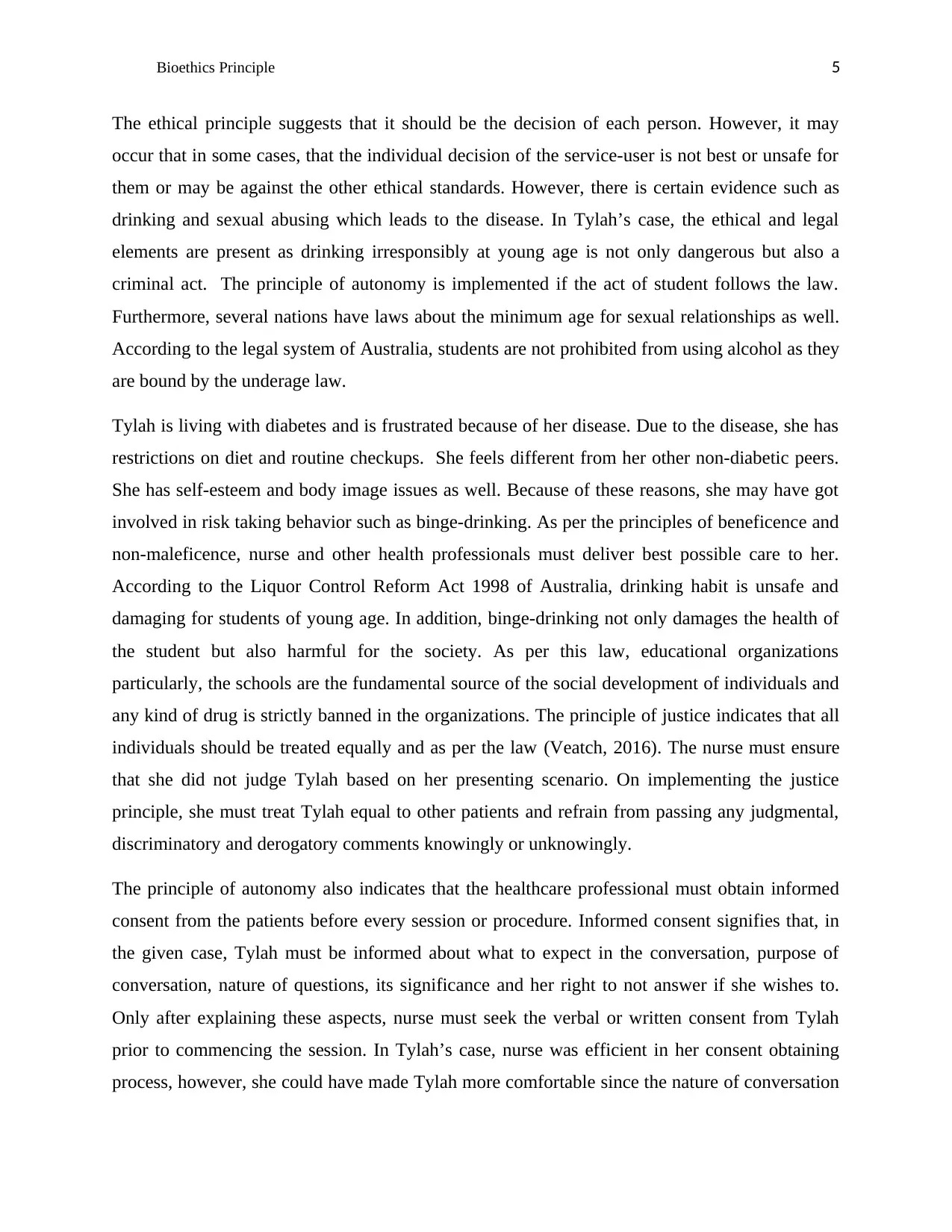
Bioethics Principle 5
The ethical principle suggests that it should be the decision of each person. However, it may
occur that in some cases, that the individual decision of the service-user is not best or unsafe for
them or may be against the other ethical standards. However, there is certain evidence such as
drinking and sexual abusing which leads to the disease. In Tylah’s case, the ethical and legal
elements are present as drinking irresponsibly at young age is not only dangerous but also a
criminal act. The principle of autonomy is implemented if the act of student follows the law.
Furthermore, several nations have laws about the minimum age for sexual relationships as well.
According to the legal system of Australia, students are not prohibited from using alcohol as they
are bound by the underage law.
Tylah is living with diabetes and is frustrated because of her disease. Due to the disease, she has
restrictions on diet and routine checkups. She feels different from her other non-diabetic peers.
She has self-esteem and body image issues as well. Because of these reasons, she may have got
involved in risk taking behavior such as binge-drinking. As per the principles of beneficence and
non-maleficence, nurse and other health professionals must deliver best possible care to her.
According to the Liquor Control Reform Act 1998 of Australia, drinking habit is unsafe and
damaging for students of young age. In addition, binge-drinking not only damages the health of
the student but also harmful for the society. As per this law, educational organizations
particularly, the schools are the fundamental source of the social development of individuals and
any kind of drug is strictly banned in the organizations. The principle of justice indicates that all
individuals should be treated equally and as per the law (Veatch, 2016). The nurse must ensure
that she did not judge Tylah based on her presenting scenario. On implementing the justice
principle, she must treat Tylah equal to other patients and refrain from passing any judgmental,
discriminatory and derogatory comments knowingly or unknowingly.
The principle of autonomy also indicates that the healthcare professional must obtain informed
consent from the patients before every session or procedure. Informed consent signifies that, in
the given case, Tylah must be informed about what to expect in the conversation, purpose of
conversation, nature of questions, its significance and her right to not answer if she wishes to.
Only after explaining these aspects, nurse must seek the verbal or written consent from Tylah
prior to commencing the session. In Tylah’s case, nurse was efficient in her consent obtaining
process, however, she could have made Tylah more comfortable since the nature of conversation
The ethical principle suggests that it should be the decision of each person. However, it may
occur that in some cases, that the individual decision of the service-user is not best or unsafe for
them or may be against the other ethical standards. However, there is certain evidence such as
drinking and sexual abusing which leads to the disease. In Tylah’s case, the ethical and legal
elements are present as drinking irresponsibly at young age is not only dangerous but also a
criminal act. The principle of autonomy is implemented if the act of student follows the law.
Furthermore, several nations have laws about the minimum age for sexual relationships as well.
According to the legal system of Australia, students are not prohibited from using alcohol as they
are bound by the underage law.
Tylah is living with diabetes and is frustrated because of her disease. Due to the disease, she has
restrictions on diet and routine checkups. She feels different from her other non-diabetic peers.
She has self-esteem and body image issues as well. Because of these reasons, she may have got
involved in risk taking behavior such as binge-drinking. As per the principles of beneficence and
non-maleficence, nurse and other health professionals must deliver best possible care to her.
According to the Liquor Control Reform Act 1998 of Australia, drinking habit is unsafe and
damaging for students of young age. In addition, binge-drinking not only damages the health of
the student but also harmful for the society. As per this law, educational organizations
particularly, the schools are the fundamental source of the social development of individuals and
any kind of drug is strictly banned in the organizations. The principle of justice indicates that all
individuals should be treated equally and as per the law (Veatch, 2016). The nurse must ensure
that she did not judge Tylah based on her presenting scenario. On implementing the justice
principle, she must treat Tylah equal to other patients and refrain from passing any judgmental,
discriminatory and derogatory comments knowingly or unknowingly.
The principle of autonomy also indicates that the healthcare professional must obtain informed
consent from the patients before every session or procedure. Informed consent signifies that, in
the given case, Tylah must be informed about what to expect in the conversation, purpose of
conversation, nature of questions, its significance and her right to not answer if she wishes to.
Only after explaining these aspects, nurse must seek the verbal or written consent from Tylah
prior to commencing the session. In Tylah’s case, nurse was efficient in her consent obtaining
process, however, she could have made Tylah more comfortable since the nature of conversation
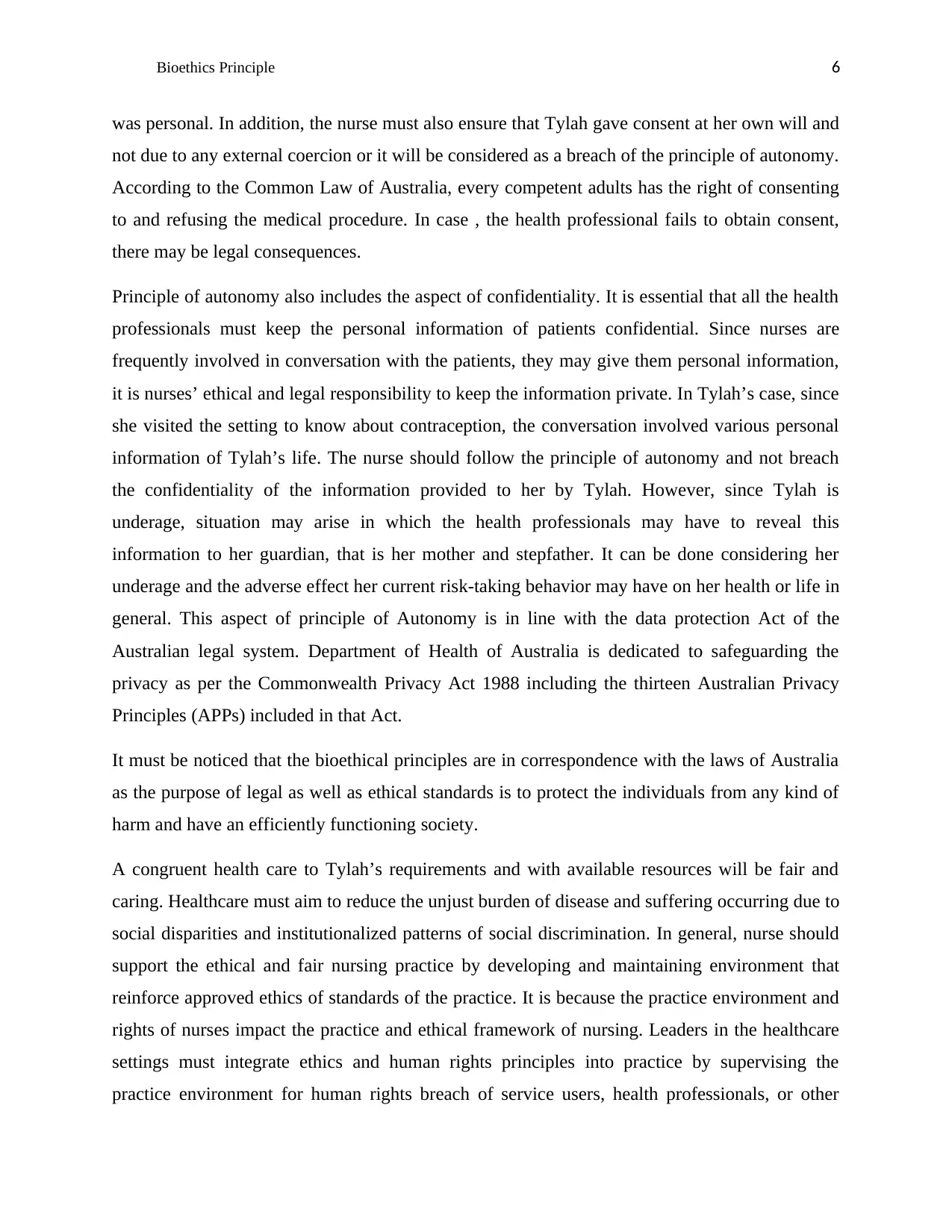
Bioethics Principle 6
was personal. In addition, the nurse must also ensure that Tylah gave consent at her own will and
not due to any external coercion or it will be considered as a breach of the principle of autonomy.
According to the Common Law of Australia, every competent adults has the right of consenting
to and refusing the medical procedure. In case , the health professional fails to obtain consent,
there may be legal consequences.
Principle of autonomy also includes the aspect of confidentiality. It is essential that all the health
professionals must keep the personal information of patients confidential. Since nurses are
frequently involved in conversation with the patients, they may give them personal information,
it is nurses’ ethical and legal responsibility to keep the information private. In Tylah’s case, since
she visited the setting to know about contraception, the conversation involved various personal
information of Tylah’s life. The nurse should follow the principle of autonomy and not breach
the confidentiality of the information provided to her by Tylah. However, since Tylah is
underage, situation may arise in which the health professionals may have to reveal this
information to her guardian, that is her mother and stepfather. It can be done considering her
underage and the adverse effect her current risk-taking behavior may have on her health or life in
general. This aspect of principle of Autonomy is in line with the data protection Act of the
Australian legal system. Department of Health of Australia is dedicated to safeguarding the
privacy as per the Commonwealth Privacy Act 1988 including the thirteen Australian Privacy
Principles (APPs) included in that Act.
It must be noticed that the bioethical principles are in correspondence with the laws of Australia
as the purpose of legal as well as ethical standards is to protect the individuals from any kind of
harm and have an efficiently functioning society.
A congruent health care to Tylah’s requirements and with available resources will be fair and
caring. Healthcare must aim to reduce the unjust burden of disease and suffering occurring due to
social disparities and institutionalized patterns of social discrimination. In general, nurse should
support the ethical and fair nursing practice by developing and maintaining environment that
reinforce approved ethics of standards of the practice. It is because the practice environment and
rights of nurses impact the practice and ethical framework of nursing. Leaders in the healthcare
settings must integrate ethics and human rights principles into practice by supervising the
practice environment for human rights breach of service users, health professionals, or other
was personal. In addition, the nurse must also ensure that Tylah gave consent at her own will and
not due to any external coercion or it will be considered as a breach of the principle of autonomy.
According to the Common Law of Australia, every competent adults has the right of consenting
to and refusing the medical procedure. In case , the health professional fails to obtain consent,
there may be legal consequences.
Principle of autonomy also includes the aspect of confidentiality. It is essential that all the health
professionals must keep the personal information of patients confidential. Since nurses are
frequently involved in conversation with the patients, they may give them personal information,
it is nurses’ ethical and legal responsibility to keep the information private. In Tylah’s case, since
she visited the setting to know about contraception, the conversation involved various personal
information of Tylah’s life. The nurse should follow the principle of autonomy and not breach
the confidentiality of the information provided to her by Tylah. However, since Tylah is
underage, situation may arise in which the health professionals may have to reveal this
information to her guardian, that is her mother and stepfather. It can be done considering her
underage and the adverse effect her current risk-taking behavior may have on her health or life in
general. This aspect of principle of Autonomy is in line with the data protection Act of the
Australian legal system. Department of Health of Australia is dedicated to safeguarding the
privacy as per the Commonwealth Privacy Act 1988 including the thirteen Australian Privacy
Principles (APPs) included in that Act.
It must be noticed that the bioethical principles are in correspondence with the laws of Australia
as the purpose of legal as well as ethical standards is to protect the individuals from any kind of
harm and have an efficiently functioning society.
A congruent health care to Tylah’s requirements and with available resources will be fair and
caring. Healthcare must aim to reduce the unjust burden of disease and suffering occurring due to
social disparities and institutionalized patterns of social discrimination. In general, nurse should
support the ethical and fair nursing practice by developing and maintaining environment that
reinforce approved ethics of standards of the practice. It is because the practice environment and
rights of nurses impact the practice and ethical framework of nursing. Leaders in the healthcare
settings must integrate ethics and human rights principles into practice by supervising the
practice environment for human rights breach of service users, health professionals, or other
⊘ This is a preview!⊘
Do you want full access?
Subscribe today to unlock all pages.

Trusted by 1+ million students worldwide
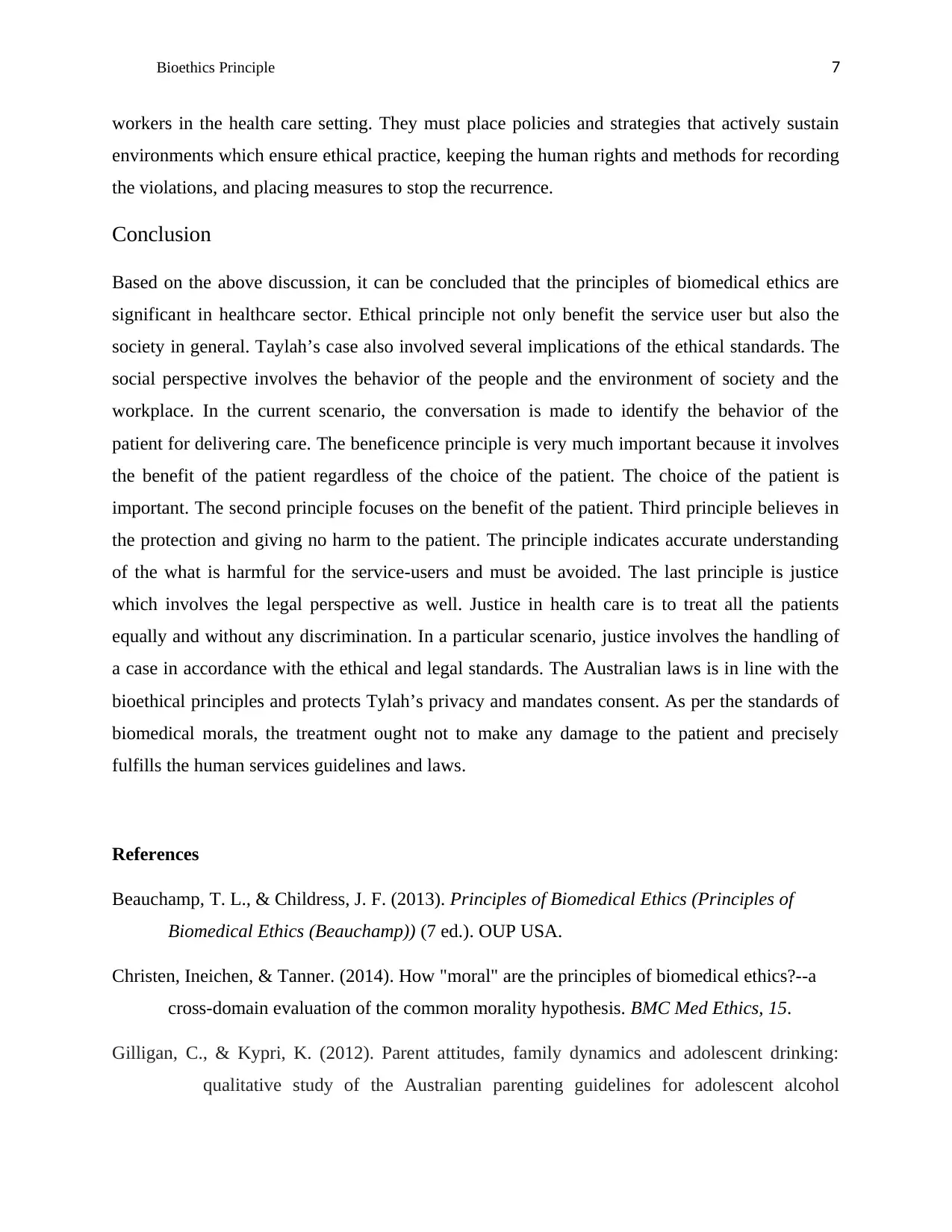
Bioethics Principle 7
workers in the health care setting. They must place policies and strategies that actively sustain
environments which ensure ethical practice, keeping the human rights and methods for recording
the violations, and placing measures to stop the recurrence.
Conclusion
Based on the above discussion, it can be concluded that the principles of biomedical ethics are
significant in healthcare sector. Ethical principle not only benefit the service user but also the
society in general. Taylah’s case also involved several implications of the ethical standards. The
social perspective involves the behavior of the people and the environment of society and the
workplace. In the current scenario, the conversation is made to identify the behavior of the
patient for delivering care. The beneficence principle is very much important because it involves
the benefit of the patient regardless of the choice of the patient. The choice of the patient is
important. The second principle focuses on the benefit of the patient. Third principle believes in
the protection and giving no harm to the patient. The principle indicates accurate understanding
of the what is harmful for the service-users and must be avoided. The last principle is justice
which involves the legal perspective as well. Justice in health care is to treat all the patients
equally and without any discrimination. In a particular scenario, justice involves the handling of
a case in accordance with the ethical and legal standards. The Australian laws is in line with the
bioethical principles and protects Tylah’s privacy and mandates consent. As per the standards of
biomedical morals, the treatment ought not to make any damage to the patient and precisely
fulfills the human services guidelines and laws.
References
Beauchamp, T. L., & Childress, J. F. (2013). Principles of Biomedical Ethics (Principles of
Biomedical Ethics (Beauchamp)) (7 ed.). OUP USA.
Christen, Ineichen, & Tanner. (2014). How "moral" are the principles of biomedical ethics?--a
cross-domain evaluation of the common morality hypothesis. BMC Med Ethics, 15.
Gilligan, C., & Kypri, K. (2012). Parent attitudes, family dynamics and adolescent drinking:
qualitative study of the Australian parenting guidelines for adolescent alcohol
workers in the health care setting. They must place policies and strategies that actively sustain
environments which ensure ethical practice, keeping the human rights and methods for recording
the violations, and placing measures to stop the recurrence.
Conclusion
Based on the above discussion, it can be concluded that the principles of biomedical ethics are
significant in healthcare sector. Ethical principle not only benefit the service user but also the
society in general. Taylah’s case also involved several implications of the ethical standards. The
social perspective involves the behavior of the people and the environment of society and the
workplace. In the current scenario, the conversation is made to identify the behavior of the
patient for delivering care. The beneficence principle is very much important because it involves
the benefit of the patient regardless of the choice of the patient. The choice of the patient is
important. The second principle focuses on the benefit of the patient. Third principle believes in
the protection and giving no harm to the patient. The principle indicates accurate understanding
of the what is harmful for the service-users and must be avoided. The last principle is justice
which involves the legal perspective as well. Justice in health care is to treat all the patients
equally and without any discrimination. In a particular scenario, justice involves the handling of
a case in accordance with the ethical and legal standards. The Australian laws is in line with the
bioethical principles and protects Tylah’s privacy and mandates consent. As per the standards of
biomedical morals, the treatment ought not to make any damage to the patient and precisely
fulfills the human services guidelines and laws.
References
Beauchamp, T. L., & Childress, J. F. (2013). Principles of Biomedical Ethics (Principles of
Biomedical Ethics (Beauchamp)) (7 ed.). OUP USA.
Christen, Ineichen, & Tanner. (2014). How "moral" are the principles of biomedical ethics?--a
cross-domain evaluation of the common morality hypothesis. BMC Med Ethics, 15.
Gilligan, C., & Kypri, K. (2012). Parent attitudes, family dynamics and adolescent drinking:
qualitative study of the Australian parenting guidelines for adolescent alcohol
Paraphrase This Document
Need a fresh take? Get an instant paraphrase of this document with our AI Paraphraser
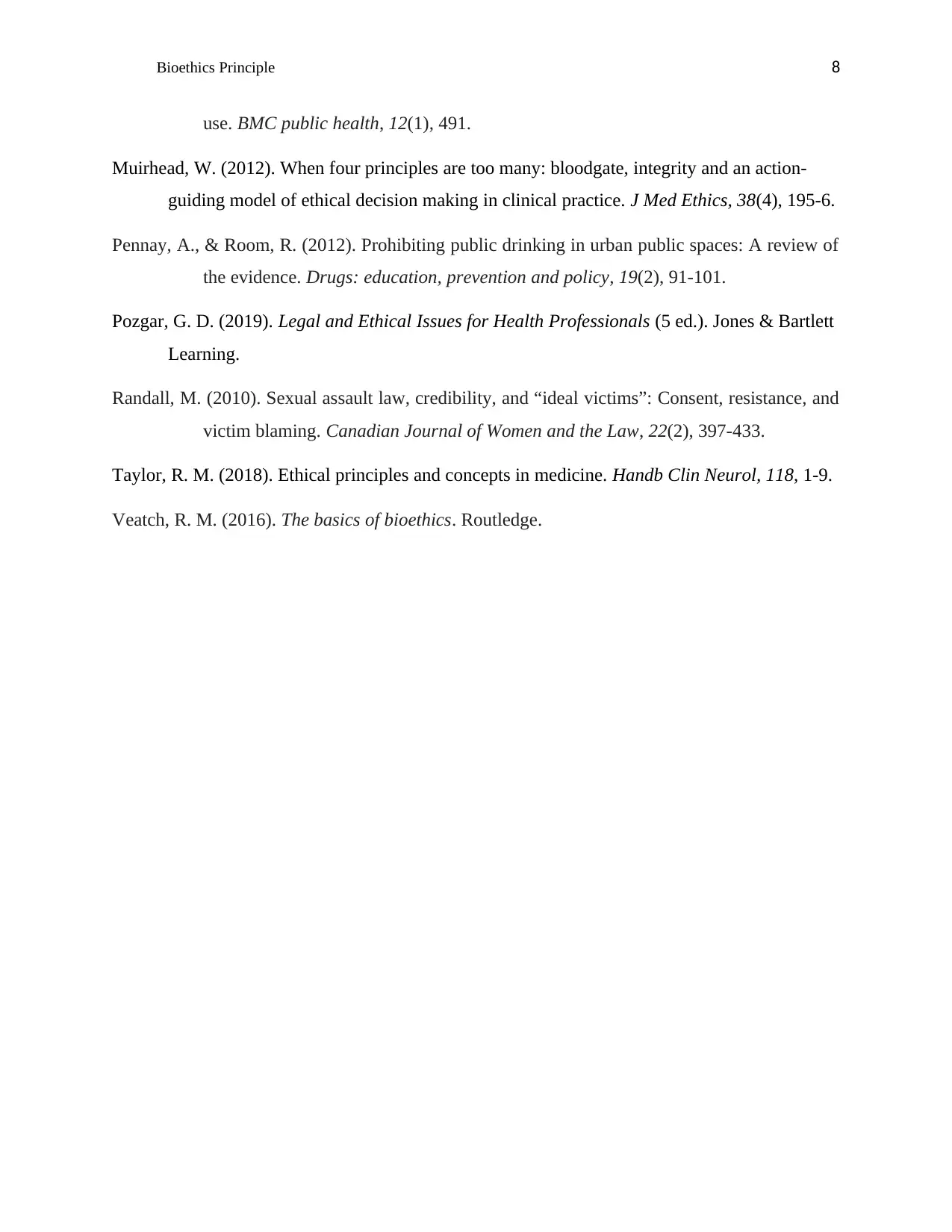
Bioethics Principle 8
use. BMC public health, 12(1), 491.
Muirhead, W. (2012). When four principles are too many: bloodgate, integrity and an action-
guiding model of ethical decision making in clinical practice. J Med Ethics, 38(4), 195-6.
Pennay, A., & Room, R. (2012). Prohibiting public drinking in urban public spaces: A review of
the evidence. Drugs: education, prevention and policy, 19(2), 91-101.
Pozgar, G. D. (2019). Legal and Ethical Issues for Health Professionals (5 ed.). Jones & Bartlett
Learning.
Randall, M. (2010). Sexual assault law, credibility, and “ideal victims”: Consent, resistance, and
victim blaming. Canadian Journal of Women and the Law, 22(2), 397-433.
Taylor, R. M. (2018). Ethical principles and concepts in medicine. Handb Clin Neurol, 118, 1-9.
Veatch, R. M. (2016). The basics of bioethics. Routledge.
use. BMC public health, 12(1), 491.
Muirhead, W. (2012). When four principles are too many: bloodgate, integrity and an action-
guiding model of ethical decision making in clinical practice. J Med Ethics, 38(4), 195-6.
Pennay, A., & Room, R. (2012). Prohibiting public drinking in urban public spaces: A review of
the evidence. Drugs: education, prevention and policy, 19(2), 91-101.
Pozgar, G. D. (2019). Legal and Ethical Issues for Health Professionals (5 ed.). Jones & Bartlett
Learning.
Randall, M. (2010). Sexual assault law, credibility, and “ideal victims”: Consent, resistance, and
victim blaming. Canadian Journal of Women and the Law, 22(2), 397-433.
Taylor, R. M. (2018). Ethical principles and concepts in medicine. Handb Clin Neurol, 118, 1-9.
Veatch, R. M. (2016). The basics of bioethics. Routledge.
1 out of 8
Related Documents
Your All-in-One AI-Powered Toolkit for Academic Success.
+13062052269
info@desklib.com
Available 24*7 on WhatsApp / Email
![[object Object]](/_next/static/media/star-bottom.7253800d.svg)
Unlock your academic potential
Copyright © 2020–2026 A2Z Services. All Rights Reserved. Developed and managed by ZUCOL.





